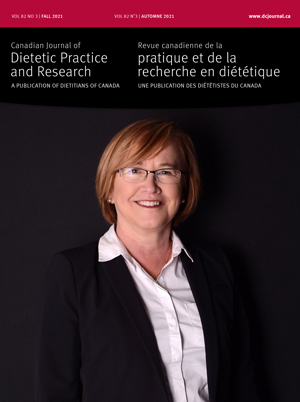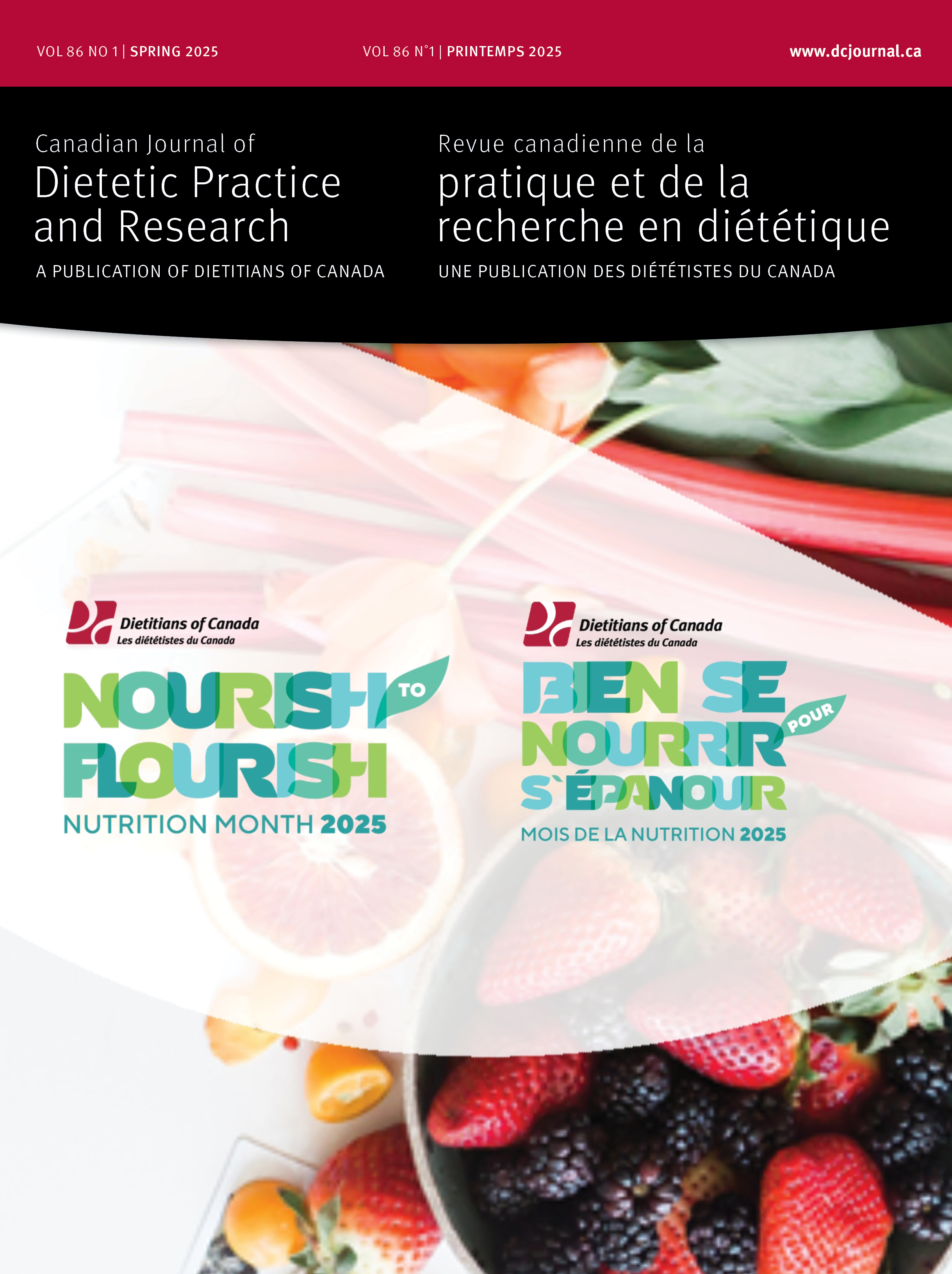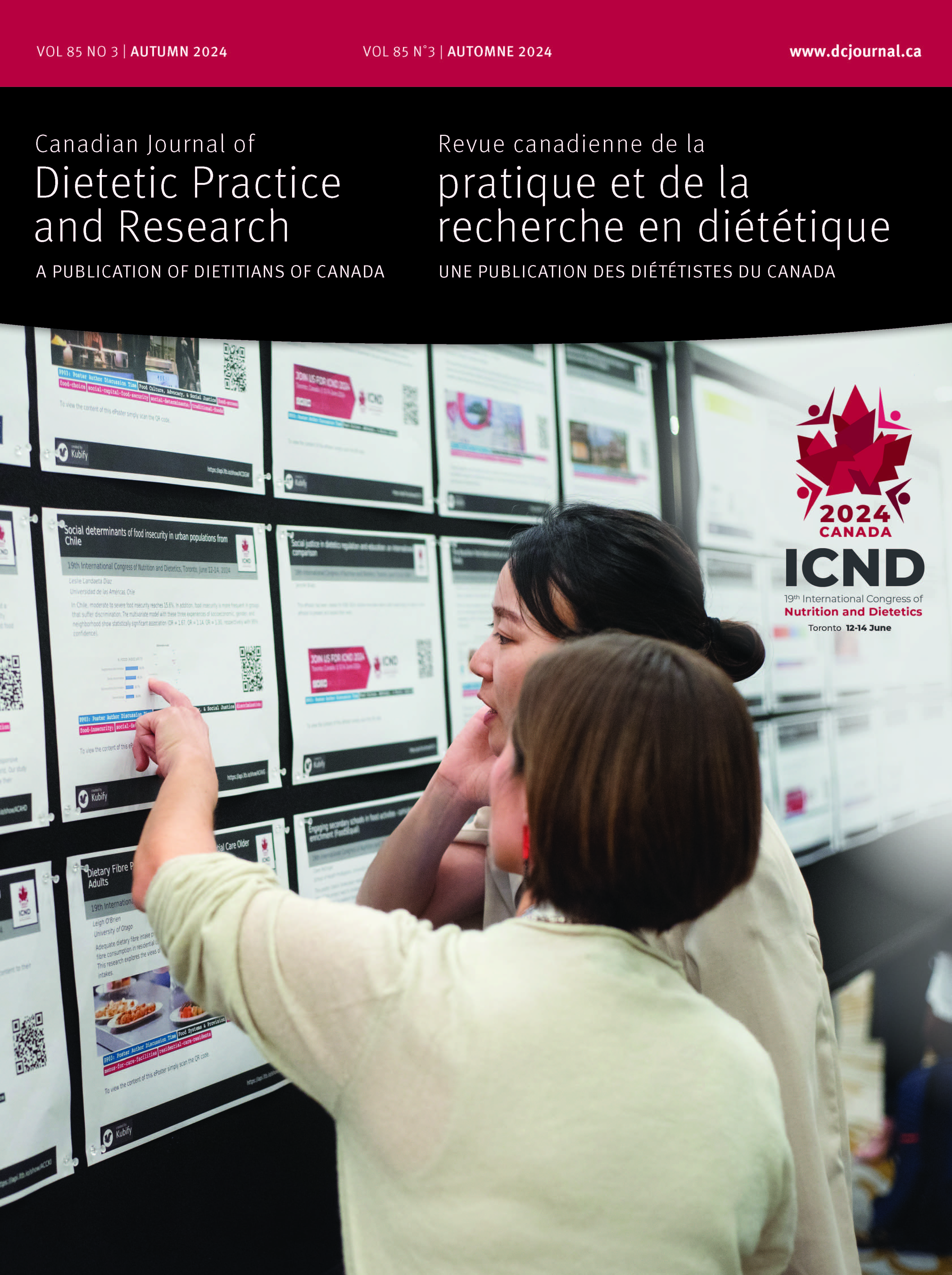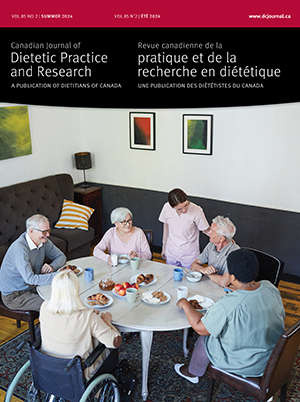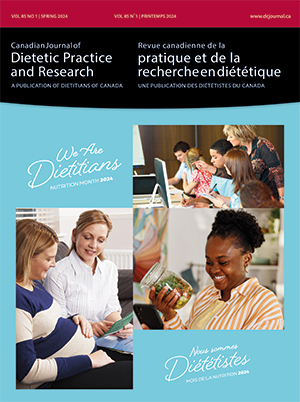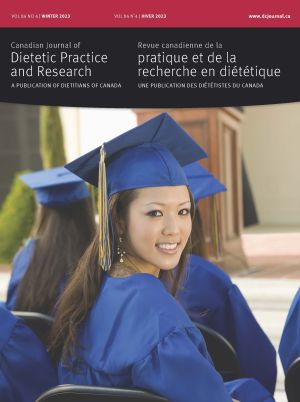Volume 82 • Number 3 • September 2021
Editor’s Message
Research
Purpose: Postsecondary students who move to a new country to continue their education experience a drastic shift in food landscape, often resulting in unhealthy dietary adaptations.Methods: This mixed-method study explored the eating experiences and dietary patterns of 30 international students attending a Canadian university. Data were collected through focus groups that were analyzed thematically and dietary records analyzed for compliance with Canada’s Food Guide for Healthy Living (2007).Results: Results showed that many participants want to maintain home country food traditions, yet their new independent living status and novel food environments led to changes in dietary habits. Limited food skills, busy schedules, reduced access to familiar foods, and fast-food environments contributed to unhealthy eating patterns. These perceptions were reflected in the high consumption of “other”, less nutritious foods and low servings of fruits and vegetables, milk products and alternatives, and grain products.Conclusions: These findings show that international university students face dual challenges of transitioning into independent living without sufficient food skills and family supports, and exposure to unfamiliar and unhealthy food environments. Resources need to be developed for newly enrolled international students that emphasize food awareness, food skills, and healthy eating habits.
Perspectives in Practice
Community gardens (CG) are areas of land where individuals or groups grow food in single or shared plots, typically in an urban setting, providing fresh produce, urban greening, and opportunities to socialize and improve the community. The purpose of this descriptive study was to introduce a CG laboratory (lab) as part of an introductory foods course within a nutrition program and explore how the lab influenced students’ learning and overall experiences. Forty-one students, 2 lab instructors, and 3 student volunteers who tended the CG participated in the survey. Survey analysis revealed 4 interrelated themes: (i) connection and exposure, (ii) food preparation, (iii) benefits of using local food, and (iv) explicit learning. Overall, the lab fostered multiple types of individual and relational learning involving the acquisition of course content and food literacy skills. The CG was valued by students as a curriculum component as well as opportunities for personal growth and development. With the growing importance of food systems knowledge to the profession, CG may act as a site for embodied forms of learning in nutrition programs.
Our purpose in writing this Perspective in Practice is to create awareness about the role of compassion within dietetic practice, particularly the role of compassion for body image tensions. Nine self-identifying gay men were recruited to a photovoice research study that explored their beliefs, values, and practices relating to food and their bodies. Compassion was found as one way to navigate body images tensions. It is not the intent of this article to review all aspects of this research study but to use it as an example to illustrate compassion in dietetics. We suggest that our findings reveal the strength of using compassionate practice within the dietetic profession. In doing so, we call upon dietitians to incorporate compassion into their clinical and client care practices to foster health and healing for all communities, especially among those who struggle with body image tensions.
Report
Purpose: Enteral nutrition intolerance (ENI) is a common complication among tube-fed patients, associated with reduced volumes of nutrition delivered, and may contribute to malnutrition risk. This research aimed to obtain insights about dietitians’ needs and preferences related to tools and resources to help identify and manage ENI.Methods: An online survey was administered to registered dietitians (RD) engaged in enteral nutrition (EN) management, recruited from a list of attendees at a national webinar. The 16-question survey asked about participant’s experience with ENI and interest in resources to manage ENI.Results: Of the 219 surveys completed (25% response rate), 86% identified ENI as an issue/concern that interferes with adequate nutrition or hydration for their patients. Ninety-seven percent reported being interested in having tools/resources to manage ENI. The symptoms identified as most pressing to manage were diarrhea (73%), bloating/abdominal discomfort (42%), and nausea (32%). Preferred types of tools were hard-copy resources (70%), algorithms (67%), and web-based instruments (62%).Conclusions: ENI remains an issue for clinicians working with tube-fed patients and RDs are interested in management tools. These results have implications for the development of evidence-based resources to help improve EN delivery and ultimately may contribute to clinician’s efforts at reducing malnutrition.
Purpose: The present study examined differences in mental health and well-being between students with and without suspected food insecurity during their transition to university.Methods: We drew on existing data from 4 samples of first-year undergraduates enrolled at 3 large universities in 3 provinces (Alberta n = 199, Québec n = 299, and Ontario n = 461 and n = 510). Students completed online surveys assessing a wide range of health-related behaviours and indicators, and students were classified as food secure or insecure based on their responses to screening questions.Results: Mental health (depression, anxiety, low satisfaction with life) was consistently poorer in students classified as food insecure across all samples. The magnitude of mental health deficit was comparable to socioeconomic disadvantage associated with food insecurity.Conclusions: Students experiencing food insecurity are disproportionately launching their university careers with poorer mental health, revealing a critical point of intervention for these socioeconomically higher-risk students.
Purpose: To examine associations between preschoolers’ diet quality and parent and child socio-demographic variables.Methods: Cross-sectional analysis with 117 preschoolers. Parents reported socio-demographics and their children’s diet using 3-day food records. Diet quality was assessed using the Healthy Eating Index (HEI) 2015. Linear regression models were used to analyze associations between socio-demographics and HEI scores.Results: A total of 86% of children had an HEI-2015 score in the “needs improvement” category (51–80 out of a maximum of 100). Children’s overall HEI-2015 score was inversely associated with children’s age (β = −0.19, 95% CI −0.37, −0.02). Parental education was positively associated with children’s overall HEI score (β = 9.58, 95% CI 3.81, 15.35) and with scores for total fruit (β = 1.00, 95% CI 0.39, 1.76), vegetables (β = 1.11, 95% CI 0.03, 2.18), total protein (β = 1.06, 95% CI 0.28, 1.84), and seafood/plant protein (β = 1.67, 95% CI 0.43, 2.89) components. Children who identified as Caucasian (β = 4.29, 95% CI 2.46, 6.14), had a Caucasian parent (β = 3.01, 95% CI 0.78, 5.25), or parents who were born in Canada (β = 2.32, 95% CI 0.53, 4.11) had higher scores for dairy.Conclusion: Our results suggest that preschoolers’ diet quality needs improvement and that children’s diet quality varies by children’s age and parental education level.
Purpose: The Social Cognitive Theory (SCT) suggests health behaviour can be modified by enhancing knowledge of health benefits and outcome expectations of changing behaviour, improving self-efficacy (confidence), and developing goals to overcome barriers to behaviour change. This study aimed to determine the impact of student-led nutrition workshops on participants’ confidence related to SCT constructs for making dietary choices that align with evidence-based nutrition recommendations.Methods: Level-4 Science students developed and delivered 9 workshops on nutrition recommendations for the prevention and management of age-related diseases. Participants attending the workshops completed pre- and post-surveys to assess SCT constructs. For each SCT construct, participants rated their confidence on a 10-point Likert scale. The number (%) of participants who rated their confidence as ≥8/10 on the pre- and post-surveys were compared using the χ2 test.Results: Sixty-three community members (60% female, mean ± SD age 71 ± 7 years) attended the workshops. The number of participants rating confidence as ≥8/10 for each SCT construct increased after the workshops (P < 0.05).Conclusion: Undergraduate students can positively influence community members’ confidence for making nutrition-related decisions. Involving students in interventions where SCT-structured workshops are used may help conserve health care resources and reach older adults who may not have access to dietitian services.
Recognition
OPEN ACCESS
How does an ordinary dietitian have an extraordinary career? What is the most important asset that a dietitian has? Why is it important to take risks, be resilient, and challenge the status quo? In this article I answer these questions by sharing the highlights of my career and describing how I was socialized into the dietetics profession and ended up as the first female President of a Canadian university in Egypt.
Canadian Foundation for Dietetic Research
OPEN ACCESS
Given the pandemic challenges we experienced over the last year, the 2021 Dietitians of Canada (DC) National Conference from May–June brought our dietetic community together from all across Canada and the world. This year the Canadian Foundation for Dietetic Research (CFDR) showcased another successful event with novel, relevant, timely research projects via the OnAIR Virtual Event Portal. Twenty-four research abstracts were submitted and reviewed by the Early Bird Abstract Review Committee. It was exciting to have research from different nutrition and dietetic practice areas represented. Thanks for all of the abstract submissions!Eight Early Bird abstracts were presented as Lightning Rounds during the virtual DC National Conference and were very well-received. The remaining 16 abstracts were displayed as posters for the duration of the conference with a live 7-min presentation opportunity from the poster gallery on May 19, 2021. All of the Early Bird abstracts are published in this issue of the Canadian Journal of Dietetic Practice and Research and are also featured on the CFDR website. These abstracts represent a wide variety of practice-based nutrition research projects in Canada.The Early Bird abstract research event would not have been possible without the commitment and dedication of many supportive individuals. On behalf of DC and CFDR, we extend a special thank you to members of our abstract review committee: Susan Campisi (University of Toronto); Pauline Darling (University of Ottawa); Andrea Glenn (St. Francis Xavier University); Mahsa Jessri (University of British Columbia); Grace Lee (University Health Network), Jessica Lieffers (University of Saskatchewan); Shelley Vanderhout (University of Toronto).A sincere thank you to all of the moderators, the DC Conference team and Izabella Bachmanek for their support with the Lightning Round presentations over the course of the DC virtual conference.Please consider submitting an abstract next year for the CFDR Research Showcase at the 2022 DC National Conference in Saskatoon, SK.Wishing all of you a wonderful Fall!Warm regards,Christina Lengyel PhD RDChair, 2021 Early Bird CommitteeProfessorDirector of the Dietetics ProgramFood and Human Nutritional SciencesUniversity of ManitobaJanis Randall Simpson PhD RD FDC FCNSExecutive Director, CFDRProfessor EmeritaUniversity of GuelphThis article was corrected after publication.


